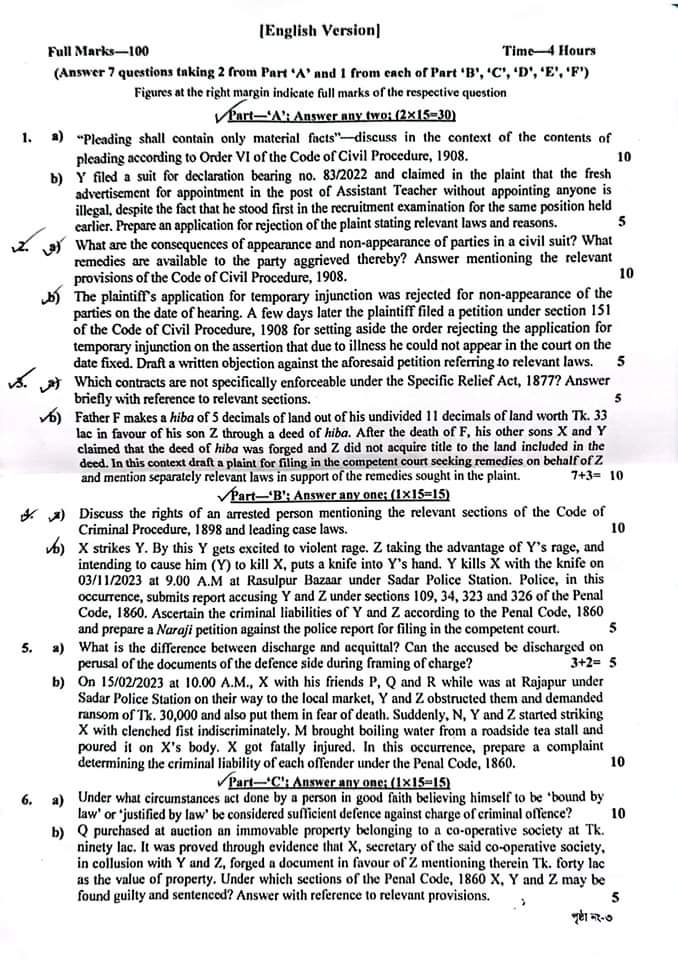Divorce / Talaq under Muslim Law: Bangladesh Perspective
In Islamic law, marriage is a legal and social institution between a man and woman. Though a marriage under Islamic Law is contractual in nature, from the religious point of view it carries a vital role in our family as well as religious life. The following verse of the Holy Quran has emphasised to sustain the sacred relation of husband and wife:
“And how could you take it back after having enjoyed each other intimately and she has taken from you a firm commitment?”………….(Al Quran: 4:21)
Unlike Hindu Law, a marriage solemnized under Muslim is dissoluble either by Divorce or the death of either party. The pros and cons of divorce under Muslim Law with related statutory provisions and case laws are going to be elaborated in this write-up.
Definition: The idea of divorce has driven from Arabic word “talaq” which means “to release”. Talaq means repudiation of marriage at the husband initiatives because husband is fully authorized to give divorce under Muslim Law. Divorce (or the dissolution of marriage) can be defined as final termination of a marital union, cancelling the legal duties and responsibilities of marriage and dissolving the marital relation between husband and wife.
“Talaq means the termination of the marriage according to Islamic Law, by the husband or his agent or intermediary, through the use or pronouncement of specific words which indicate a clear intention to terminate the marriage; and includes the Tafwid ul Talaq”( https://www.justice.gov.za)
Modes: Under the Muslim Law a marriage is dissolved either by the death of the husband or wife, or by divorce. After the death of a wife, the husband may remarry immediately. On the other hand, if husband dies, wife cannot remarry before a certain specified period called Iddat expires.
Classification of Divorce:
Extra Judicial Divorce: Extra judicial divorce is when it is done at the will of husband or wife or when it is by mutual agreement. On this basis divorce may be completed in the following modes:
1. By Husband- Talaq, Ila and Zihar
2. By Wife- Talaq-i-tafweez, Lian
3. By Mutual Agreement/Consent- Khula and Mubarak
Judicial Divorce or Fask: If talaq is sanctioned by court, it is called fask or talaq by judicial procedure.
Divorce by Husband:
Talaq: Generally rights to give divorce are solely given to husband only. Husband’s desire to break the marriage is sufficient as per Islamic law. In this respect, no specific form i.e. presence of witness, permission from wife is required to complete thus. Under Hanafi and other Sunni law, even if the talaq is declared in sudden provocation and anxiety or intoxication, it will not be a bar for talaq to be effective. But Shia law is different in this regard.
Talaq can be divided into two categories:
1. Talaq-al-Sunnah
2. Talaq-al-Bida
Talaq-al-Sunnah: When talaq is given following the forms approved by the prophet (SM) through his Sunnah, it is called talaq-al-sunnah. It is considered to be in accordance with the dictator of Prophet Mohammad (SM). It has two forms:
Ahasan:
It consists of a single pronouncement of divorce made in the period of tuhr (purity, period between two menstruations), or at any time, if the wife is free from menstruation. Husband must abstain himself from intercourse for the period of iddat. Taking up of sexual intercourse or revocation thereof before the completion of period of iddat (90 days) invalidates the divorce. Once, divorce is completed through ahsan form for 3 (three) times between husband and wife, they cannot remarry with each other without intervening hila marriage. But, after the first and second time they can remarry without intervening marriage.
(1 Pronoucement + in a tuhr /purity period+ effective after iddah (90 days) unless it is revoked or intercourse is resumed)
Hasan:
In this form of divorce the husband is required to pronounce talaq three time during three successive tuhrs (three consecutive purity periods). When the last pronouncement is made, the talaq, becomes final and irrevocable. But this type of divorce can be revoked at any time before the third pronouncement. Once the divorce is completed, the husband and wife are barred to remarry each other.
(3 Pronouncements + in three consecutive tuhr/purity period + effective after the third pronouncement unless revoked
ILA:
In Ila, the husband takes an oathin the name of Almighty Allah not to have sexual intercourse with his wife. The marriage is dissolved irrevocably, if no sexual intercourse is happened withing 4 (four) months followed by the oath. But in case of resumption of intercourse by the husband cohabitation within four months, Ila is cancelled automatically and it does not dissolve the marriage.
ZIHAR:
In this mode the husband compares his wife with a woman within his prohibited relationship (Muharramat) e.g. mother or sister etc. The husband would say that from today the wife is like his mother or sister. After such a comparison the husband cannot cohabit with his wife for a period of four months. Upon the expiry of the said period Zihar is complete. After the expiry of fourth month the wife may either go to the court to get a decree of judicial divorce or ask the court to grant the decree of restitution of conjugal rights. However, Zihar does not dissolve the marriage ip so facto unless further steps are taken.
Talaq by Wife/ Talaq-i-Tawfeed:
It can be availed by delegation, fask, khul or judicial khul. Under traditional Sharia Law, a Muslim woman cannot dissolve her marriage without the consent of the husband. The Muslim husband is free to delegate his power of asking divorce to his wife. He may delegate the power absolutely or conditionally, temporarily or permanently.
LIAN:
If the husband brings false charges of un-chastity or adultery against his wife and these amounts to character assassination, the wife will get the right to ask for divorce on this ground. Such a mode of divorce is called Lian. However, Lian does not automatically dissolves marriage, rather it creates a ground for asking the divorce.
Taklaq By Mutual Agreement:
1. KHULA:
A Muslim women has a right to ask for divorce if she does not desire to live with her husband even where he is not at fault. This can happen where the husband agrees to let the wife get divorce with some conditions like compensation. Once a Khula has been accepted by the husband and affected, the husband has no power to cancel it on the ground that the consideration has not been paid and his remedy is to sue the wife for it. Husband can get compensation from wife in this form of talaq but the amount of mahr must be paid by the husband.
2. MUBARAT:
Mubarat is also a form of dissolution of marriage contract. It signifies a mutual discharge from the marriage claims. In Mubarat the decision is mutual and both the sides desire separation. Thus it involves an element of mutual consent. In this mode of divorce, the offer may be either from the side of wife or from the side of husband. When an offer mubarat is accepted, it becomes an irrevocable divorce ( talaq-ul-bain) and iddat is necessary. In mubarat no compensation is payable to either side for its being mututal consent but the husband must pay unpaid mahr and maintenance.
Judicial Divorce/ Talaq by Court; Fask:
If the talaq is sanctioned by court, it is called fask or talaq by judicial procedure. In Bangladesh Family courts (all assistant judges courts) are empowered to deal with the matter of talaq (section 5 of the Family Courts Ordinance, 1985) The following grounds for fask/judicial Khul are provided in section 2 of the Dissolution of Muslim Marriage Act, 1939 on which a woman married under Muslim law shall be entitled to obtain a decree for divorce for the dissolution of her marriage:
1. That the whereabouts of the husband have not been known for a period of four years.
2. That the husband has neglected or has failed to provide for her maintenance for a period of two years
3. That the husband has been sentenced to imprisonment for a period of seven years or upwards
4. That the husband has been sentenced to imprisonment for a period of seven years or upwards.
5. That the husband has failed to perform, without reasonable cause, his marital obligations for a period of three years.
6. That the husband was impotent at thetime of the marriage and continues to be so.
7. If the husband has been insane for a period of two years or is suffering from leprosy or a virulent venereal disease.
8. That she, having been given in marriage by her father or other guardian before she attained the age of fifteen years, repudiated the marriage before attaining the age of eighteen years, provided that the marriage has not been consummated.
9. That the husband treats her with cruelty i.e; habitually assaults her or makes her life miserable.
10. On any other ground which is recognized as valid for the dissolution of marriage under Muslim law.
Basis of Statutory procedure of Divorce:
“And if you have reason to fear that a breach might occur between a [married] couple, appoint an arbiter from among his people and an arbiter from among her people; if they both want to set things alright, God may bring about their reconciliation. Behold, God is indeed all-knowing, aware.” Al-Quran: 4:35
Statutory procedure of Divorce
Section 7 of the Muslim Family laws Ordinance, 1961 provides the procedure of divorce and puts it thus:
(1) Any man who wishes to divorce his wife shall, as soon as may be after the pronouncement of talaq in any form whatsoever, give the Chairman notice in writing of his having done so, and shall supply a copy thereof to the wife.
(2) Whoever contravenes the provisions of sub-section (1) shall be punishable with simple imprisonment for term which may extend to one year or with fine which may extend to 10 [ten thousand taka] or with both.
(3) Save as provided in sub-section (5), a talaq unless revoked earlier, expressly or otherwise, shall not be effective until the expiration of ninety days from the day on which notice under sub-section (1) is delivered to the Chairman.
(4) Within thirty days of the receipt of notice under sub-section (1), the Chairman shall constitute an Arbitration Council for the purpose of bringing about a reconciliation between the parties, and the Arbitration Council shall take all steps necessary to bring about such reconciliation.
(5) If the wife be pregnant at the time talaq is pronounced, talaq shall not be effective until the period mentioned in sub-section (3) or the pregnancy, whichever be later, ends.
(6) Nothing shall debar a wife whose marriage has been terminated by talaq effective under this section from re-marrying the same husband, without an intervening marriage with a third-person, unless such termination is for the third time so effective.
Effect of Non-service of Notice
Both of Bangladesh and Pakistani Courts are divided in opinion as to whether non-service of notice of talaq under section 9 renders the talaq/divorce ineffective or not. Following decisions of the Supreme Court may clarify the issue:
Whether pronounced talaq by swearing an Affidavit is a valid talaq in the eye of law as no notice to the Chairman of the Union Council was served……
“Section 7 (1) of the Ordinance provides for giving of notice of talaq to the Chairman and a copy thereof to the wife and provides for punishment for contravention and this law overrides any other provision of any other law. But there being clear intention to divorce by the Affidavit on the part of the petitioner and the same having been disclosed and produced before the lower appellate court by the petitioner himself. The petitioner cannot take advantage of his own wrong and cannot claim the benefit of non-service of notice by him to the Chairman. He is bound by his admission. Payment of dower being obligatory as per Nikahnama the wife is entitied to the same on talaq. [Para-8]”
……Md. Serajul Islam Vs. Most. Helena Begurn & Ors 7BLT (AD)-137
“Talaq in any form shall not stand effective and Talaq shall be not Talaq in the eye of law unless provision contained in section 7(1) is sternly complied with and in the event of subsistence of existing marriage no man can enter into second marriage and if he enters he shall contribute himself to be punished under section 6(5) of The Ordinance.”
…….Dilruba Aktar vs AHM Mohsin 55 DLR 568






